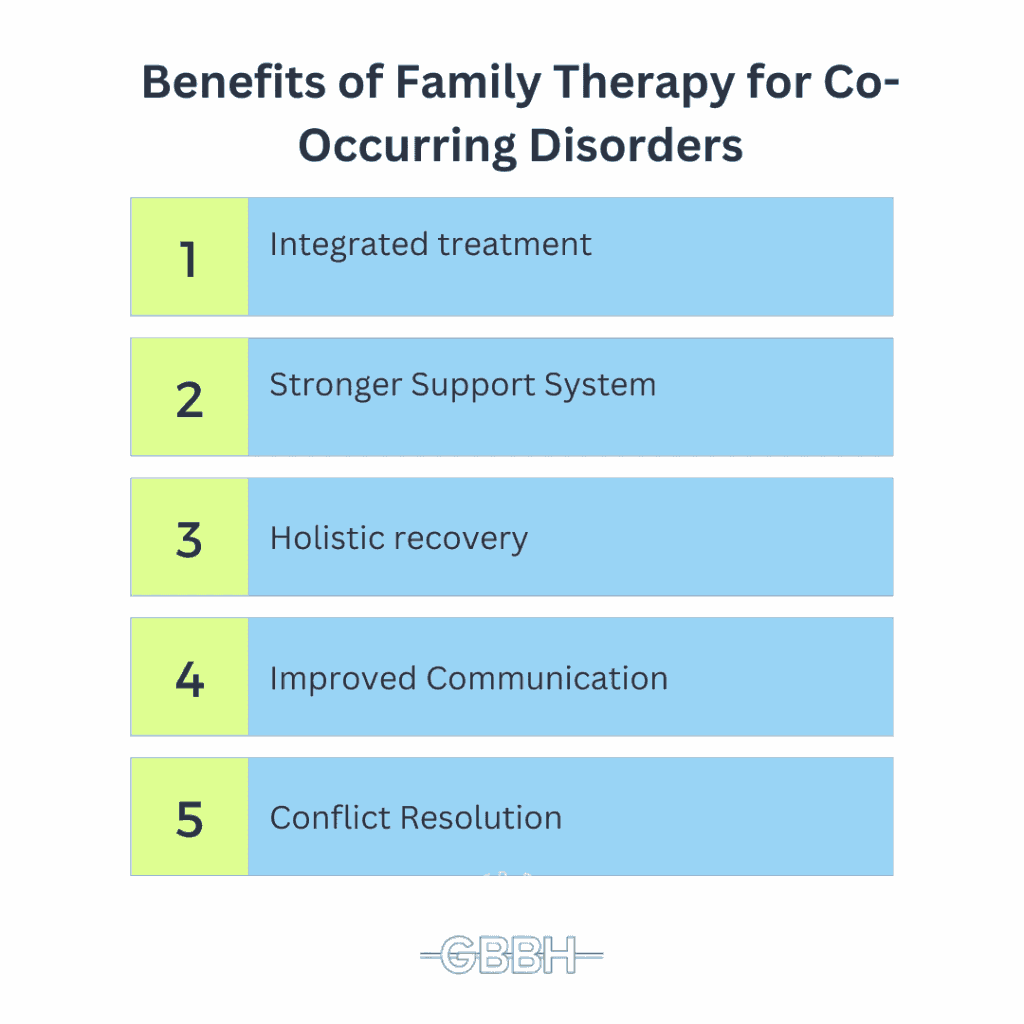When it comes to treating addiction and mental health issues, many people often focus on individual therapy. However, family therapy is also a powerful tool in addressing these challenges. Family therapy plays a crucial role in helping individuals heal by involving their loved ones in the recovery process. Let’s explore how family therapy impacts addiction and mental health, and how it is integrated into various mental health programs.
What Is Family Therapy?
Family therapy is a type of counseling that involves the whole family rather than just the individual experiencing addiction or mental health issues. It aims to improve communication, resolve conflicts, and build stronger relationships within the family. Family therapy acknowledges that addiction and mental health problems affect not just the person struggling but everyone around them. It provides a space for family members to express their feelings, understand each other’s perspectives, and learn healthy ways to support one another.
The Importance of Family in Recovery
Addiction and mental health disorders are often seen as individual struggles, but families are deeply impacted as well. In many cases, family dynamics can contribute to or exacerbate a loved one’s issues, whether through enabling behaviors, poor communication, or unresolved trauma. Conversely, families can be a source of tremendous support when properly engaged in the recovery process.
Family therapy acknowledges the importance of the family unit and works to:
- Repair broken communication lines
- Address underlying family conflicts
- Strengthen relationships and build trust
- Provide education on addiction and mental health issues
- Equip family members with the tools to support their loved one’s recovery
The overall goal is to create a healthier, more supportive home environment that fosters long-term recovery and emotional well-being for all family members.
How Does Therapy Help During Recovery?
Family therapy can be a game-changer in addiction recovery. Many people suffering from addiction find it hard to break free from their habits without support. At a Mental Health Treatment Center in Massachusetts, family therapy is often included as part of a comprehensive Intensive Outpatient Program (IOP) or an day treatment Program. This type of therapy helps families understand the dynamics that may contribute to addiction, such as enabling behaviors or unresolved trauma.
They learn to recognize signs of relapse, provide encouragement, and create a healthy environment that fosters long-term sobriety. The therapy also provides families with strategies to manage stress and cope with any emotional pain caused by their loved one’s addiction.
How Family Therapy Benefits Addiction Recovery
Addiction can strain even the strongest family bonds. Miscommunication, mistrust, and feelings of anger or betrayal often arise when a family member is dealing with substance abuse. Family therapy provides a safe space for everyone to voice their concerns, feelings, and frustrations in a productive way.
1. Breaking the Cycle of Enabling
Many families, in an effort to protect their loved one, inadvertently engage in enabling behaviors. This might include ignoring the signs of addiction, covering up for the person’s actions, or providing financial support that perpetuates the cycle. Family therapy helps family members recognize and break these patterns, fostering healthier relationships and accountability.
2. Improving Communication and Conflict Resolution
In families affected by addiction, communication often breaks down, leading to misunderstandings and unresolved conflicts. Family therapy works to rebuild communication skills, teaching family members how to listen actively, express their emotions without blame, and resolve conflicts in a constructive way.
3. Creating a Supportive Environment
A strong support system is crucial for anyone in recovery. Through family therapy, family members learn how to provide emotional support without enabling destructive behaviors. This can make a significant difference in an individual’s recovery journey, as a positive home environment increases the chances of long-term sobriety.
4. Addressing Co-Occurring Mental Health Issues
Many individuals struggling with addiction also face co-occurring mental health disorders, such as depression or anxiety. Family therapy addresses these dual diagnoses by helping the family understand the complexities of both issues and how they are interconnected. This holistic approach ensures that the individual receives the emotional and psychological support needed for recovery.
How Family Therapy Supports Mental Health
Family therapy is also valuable in addressing various mental health conditions, such as depression, anxiety, bipolar disorder, and more. It is often combined with other Mental Health Therapy Programs like Cognitive-behavioral therapy (CBT) or Dialectical behavior therapy (DBT) to provide a more comprehensive approach to treatment.
CBT focuses on changing negative thought patterns that contribute to mental health disorders, while DBT emphasizes emotional regulation and coping skills. When family therapy is added to these treatment modalities, it helps patients feel more supported and understood by their families. It also helps families learn to recognize symptoms, understand the triggers, and provide effective support without judgment.
Why Choose Family Therapy?
- Strengthened Support Systems: A strong support system is essential for anyone dealing with addiction or mental health challenges. Family therapy helps rebuild trust and strengthen family bonds, creating a more supportive environment for recovery.
- Reduced Risk of Relapse: Research shows that individuals are less likely to relapse when their families are involved in their treatment.
- Better Understanding of Addiction and Mental Health: Family members often feel helpless or frustrated when they don’t understand what their loved one is going through. Family therapy educates families about addiction and mental health conditions, which can lead to greater empathy and understanding.
The Role of Family Therapy in Treating Co-Occurring Disorders
When addiction and mental health disorders occur together (known as co-occurring disorders), the complexity of treatment increases. Family therapy is especially crucial in these cases because it addresses both issues simultaneously, helping the family understand how addiction and mental health program influence each other.
Benefits of Family Therapy for Co-Occurring Disorders:
- Integrated treatment: Family therapy allows for a comprehensive approach to treating both addiction and mental health conditions, ensuring that no aspect of the individual’s struggle is overlooked.
- Support system: The family becomes a key part of the support system, helping to monitor both the addiction and mental health symptoms, and providing the necessary encouragement during treatment.
- Holistic recovery: By focusing on both the individual and family unit, family therapy offers a holistic approach that fosters emotional, mental, and relational healing.
How to Incorporate Family Therapy into Your Recovery Plan
If you or a loved one is struggling with addiction, mental health issues, or both, family therapy can be an invaluable tool in the healing process. Incorporating family therapy into your recovery plan can provide the support and understanding needed to navigate the complexities of addiction and mental health recovery.
At Greater Boston Behavioral Health, we offer comprehensive family therapy programs designed to help individuals and their families overcome the challenges of addiction and mental health. Our evidence-based approaches focus on healing the entire family, promoting lasting recovery and emotional well-being.
How Can You Find A Good Treatment Center?
If you’re looking for a Mental Health Treatment Center in Massachusetts that incorporates family therapy, it’s essential to find one that offers a range of options, such as Intensive Outpatient Programs or Outpatient Programs. These programs typically provide a combination of individual and family therapy, along with other therapies like CBT and DBT.
Make sure to ask about the different Mental Health Therapy Programs available and how they integrate family therapy into their approach. Look for centers that offer flexible scheduling to accommodate the needs of all family members, and those with experienced therapists who specialize in family dynamics and addiction recovery.
Conclusion
Family therapy is a powerful and effective approach to treating addiction and mental health issues. By involving loved ones in the healing process, it provides a holistic way to address the underlying issues that contribute to these conditions. Whether you’re considering an Intensive Outpatient Program or an Outpatient Program, integrating family therapy into the treatment plan can make a significant difference in achieving long-term recovery and mental well-being.
If you or someone you know is struggling, consider GBBH Mental Health Treatment Center in Massachusetts that offers comprehensive programs including family therapy. The road to recovery is challenging, but with the right support, it can also be a journey toward a healthier, happier life for everyone involved. Call us today at (888)278-0716 to begin healing today.
FAQs About Impact of Family Therapy on Addiction and Mental Health
What is family therapy?
Family therapy is a type of psychotherapy that involves working with families to address issues and improve relationships. It can be a valuable tool for treating addiction and mental health problems.
Why is family therapy important in treating addiction and mental health?
Family therapy can play a crucial role in treating addiction and mental health by:
- Improving communication: Family therapy can help family members improve their communication and problem-solving skills.
- Addressing underlying issues: Family therapy can address underlying family dynamics that may contribute to addiction or mental health problems.
- Providing support: Family members can provide emotional support and encouragement to the individual in recovery.
- Preventing relapse: Family therapy can help prevent relapse by teaching family members how to respond to triggers and crises.
How can family therapy help individuals struggling with addiction?
Family therapy can help individuals struggling with addiction by:
- Increasing motivation: Family members can provide encouragement and support, which can increase an individual’s motivation to recover.
- Improving coping skills: Family therapy can help individuals develop coping skills to manage stress and triggers.
- Reducing relapse risk: Family therapy can help individuals identify and address underlying issues that may contribute to relapse.
What is family therapy in the context of addiction and mental health?
Family therapy is a form of counseling that involves family members in the treatment of a person struggling with addiction or mental health disorders. It focuses on improving communication, addressing conflicts, and providing education to create a supportive environment that fosters long-term recovery and emotional well-being.
How does family therapy help with addiction recovery?
Family therapy helps by addressing the dynamics within the family that may contribute to or exacerbate addiction. It works to break enabling behaviors, improve communication, and provide emotional support, all of which are critical for an individual’s recovery journey. A healthier family environment can significantly enhance the likelihood of long-term sobriety.
Can family therapy address co-occurring disorders (addiction and mental health issues)?
Yes, family therapy is particularly effective for treating co-occurring disorders. It helps families understand the complex relationship between addiction and mental health and provides strategies to support recovery from both conditions simultaneously. By addressing both issues, family therapy offers a comprehensive treatment approach.


